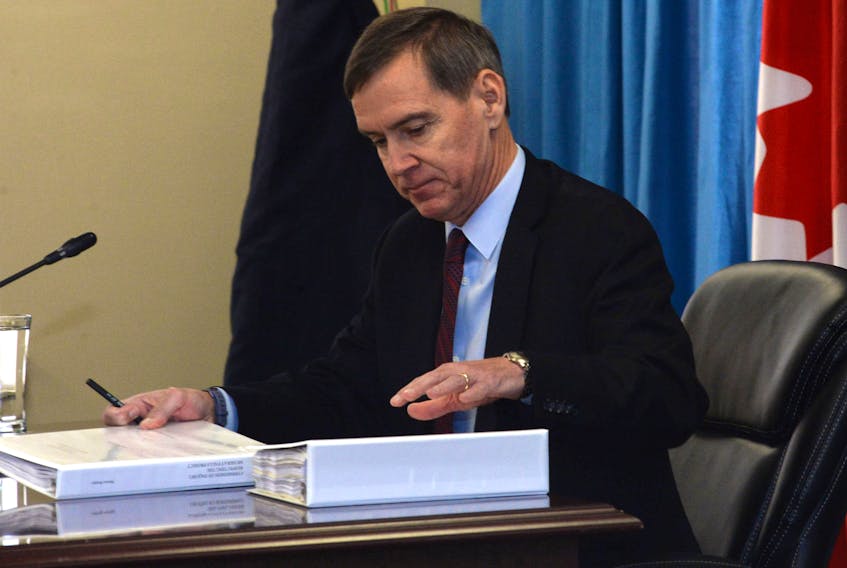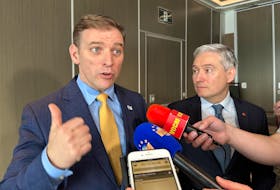Little things count, too.
Part of the big news from the Muskrat Falls inquiry this week is that there were clear warnings that the massive hydroelectric project would go over-budget and over-schedule before the project was even started.

Those warnings came from an independent project review (IPR) team, doing what has been characterized as a “cold-eyes” analysis of the assumptions used to get the project sanctioned.
But what’s interesting is what happened in a smaller forum: when Nalcor executives didn’t like the wording of the IPR team report.
It’s a small piece in the greater scheme of things Muskrat, but it’s important to talk about, if for no other reason than to ask whether there was an “us and them” mentality at Nalcor.
The IPR had completed a draft report on what it saw as the project’s progress towards Decision Gate 3 (DG3). It was one of the last steps before sanctioning the project, and it was meant to be independent of the project’s managers.
Turned out, at least one of the project managers wanted changes made in the independent team’s report.
“We are proposing some wording for the draft IPR report … which we believe does not change the substance of the first draft and the messages it contained (—) it simply uses language that could not be taken out of context and easily used in a negative sense. I know this was not the intent but we exist in a climate where words can be twisted and used in a manner that was not what the writer meant,” wrote Paul Harrington, the project director for the Lower Churchill project (LCP), to IPR team member Derek Owen.
But were the changes in language more than just tone?
Turned out, at least one of the project managers wanted changes made in the independent team’s report.
The suggested changes included removing references to some funding reserves and adding lines to say things like, “(Pro-active) risk management has been a key feature of Nalcor’s work leading up to DG3.”
In another part of the report, where the IPR said they couldn’t comment on work that wasn’t yet complete, Harrington wanted a change to drop the “no comment” and say instead that the IPR team understood that “appropriate cost and schedule allowances” would be included in the final projects costs and schedule.
In other words, the IPR would be prejudging as “appropriate” work it hadn’t seen.
Other changes are more discrete: compare “The LCP Project Execution and Project Risk Management Plans describe the use of Management Reserve and Schedule Reserve for this purpose” to, “The LCP Project Execution and Project Risk Management Plans consider the appropriate use of Management Reserve and Schedule Reserve for this purpose.”
The IPR didn’t originally deem that use of reserve funds as appropriate — the change would mean that they had.
Another change? The IPR originally recommended that certain financial figures “be included in the projection sanction costs and schedules.”
The alternative version would have shown that those additional funds be “recognized in the project sanction decision making process” instead of being included in the project’s cost.
All of it sounds minor enough, but it served to keep significant increases in the project’s overall budget from being revealed to the public.
The blunt fact is that at least one member of the IPR team thought the changes were significant — and unacceptable.
IPR team member Richard Westney wrote to Owen, saying, “Here is the first point: we absolutely cannot allow our work product to be dictated or edited by Nalcor management or the LCH project management and then issued as IPR team work product. This violates our obligation to the Gatekeeper and our IPR charter, not to mention our professional ethics. … (There) are some suggestions I am comfortable with and some I am not; also some things that were deleted I feel should not have been. We need to discuss.
“I do not agree that the changes are acceptable as given.”
Harrington apparently backed off, with Owen writing in an email to Westney, “In addition I believe finally Paul got the message that the Project could not embellish our Key Messages to the point that they were no longer the IPR findings. I have requested confirmation that the report remains ‘as written.’”
As Harrington himself wrote when he asked the independent reviewers to change their report in the beginning, “we exist in a climate where words can be twisted and used in a manner that was not what the writer meant.”
That sword cuts both ways.
The issue, of course, is what was more important: the facts about the project, or whether the project had to be cast in the best possible light?
Russell Wangersky’s column appears in 36 SaltWire newspapers and websites in Atlantic Canada. He can be reached at [email protected] — Twitter: @wangersky.









